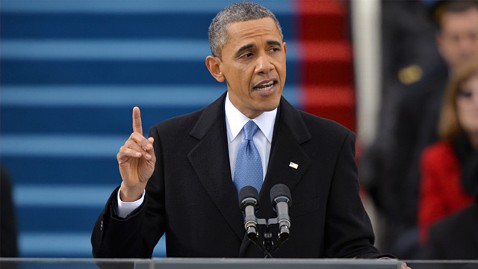So close to that presidential microphone . . . yet so far away.
As President Obama delivered his 2,000-word inaugural address Monday outside the Capitol, his chief governing partner, Vice President Biden, looked on from his chair just to the left, always the loyal and supportive cheerleader.
But for Biden, who mounted two unsuccessful bids for the White House, Inauguration Day served as another reminder of all that he has achieved and what has eluded him after 40 years in public life. And his prominent role in so many of the administration’s recent high-profile initiatives has raised questions about whether Biden has plans to be in Obama’s place on the podium four years from now.
But Biden, 70, was not complaining. Speaking briefly at a post-inauguration lunch in the Capitol, Biden told the assembled power brokers, including former presidents Bill Clinton and Jimmy Carter, that he was thankful.
He said that as he and President Obama left the inaugural platform, he watched as the Obamas stopped to take in the moment and felt himself moved.
“I surprised myself by turning to him and saying, ‘Thank you. Thanks for the chance, the chance to continue to serve,’” Biden said at the luncheon.
Obama has lately returned the gratitude. Over the past several weeks, the vice president has been on something of a roll: playing a pivotal role in the financial deal with congressional Republicans to avoid the fiscal cliff; heading the administration’s gun violence task force that recommended many of the proposals Obama laid out last week; and even going viral on video while enthusiastically working the room during Congress’s swearing-in ceremony.
During the inaugural parade, Biden relished the chance to walk portions of the route with wife Jill, pointing at the crowd, pumping his fist and even shaking hands and hugging spectators in a way the Obamas did not (perhaps partly because of Secret Service concerns).
Biden’s run of successes has again raised questions among political pundits over whether he still has his eye on a White House run.
“What’s great about this last series of [Biden] stories is that people get to see what people in Delaware saw all those years — why he was re-elected seven times,” said former senator Ted Kaufman, a long-time Biden adviser who attended the vice president’s private swearing-in on Sunday at the Naval Observatory.
“When he was running for president in 2008 and I was helping, people asked me one reason that Joe Biden should be elected,” Kaufman said. “I said that I had never seen anyone in my 40 years in politics who could go into a room with people with disparate views and find the common ground to move forward.”
In an interview with CNN this week, Biden credited his long relationships on Capitol Hill and his close partnership with Obama for making it easy for him to make deals on behalf of the administration.
“Everybody talks about, ‘Well, it’s back-slapping, it’s old politics.’ It’s not. It’s trust,” Biden said. “It’s simple: Find a single person who will look you in eye and say, ‘I don’t trust Joe Biden.’”
Biden was sworn in on a five-inch-thick family Bible featuring a Celtic cross. While Obama had only a dozen people at his private swearing-in on Sunday, Biden invited about 120 friends and family, including people who had helped on many of his Senate and presidential campaigns. They joined the Bidens at the vive-presidential home at the Observatory and stayed for breakfast, reminiscing about their years serving Biden, Kaufman said.
At the post-inauguration lunch in the National Statuary Hall on Monday, Biden looked at the room full of his former congressional colleagues and did a little reflecting of his own about the years he attended the lunch as a senator.
“It’s always a new beginning any time we’re in this room. There’s a sense of possibility and opportunity and a sense, sometimes fleeting, that maybe we can really begin to work together,”Biden said.
Later, he offered a heartfelt toast to Sen. Charles Schumer (D-N.Y.), who mistakenly thought the glass-raising was for Obama.
“I’m toasting you Chuck,” Biden said, drawing laughs. “Remember you can’t get rid of me. I’m always part of the Senate.”
“The best parts of these events are unscripted,” Schumer replied, speaking perhaps for everyone who appreciates Joe Biden, especially in front of a microphone.











